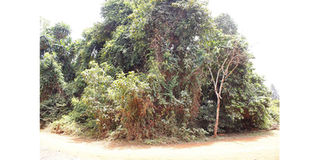Meru elders heed calls to include women in traditional courts

Rwerea Njuri Ncheke Shrine in Tigania Central, Meru County. Meru elders will now allow women in their shrines to help determine cases.
What you need to know:
- The council of elders has been an all-male club but has now agreed to include women in its revered shrines.
- Secretary general Josphat Murangiri said they were restructuring their system to end age-old restrictions.
- He said the move had been difficult to adopt as they believed it would lead to exposure of community secrets.
The Ameru Council of elders (Njuri Ncheke) has bowed to pressure to include women in their courts in alternative dispute resolution, to conform to the Constitution.
The council has been an all-male club but has now agreed to include women in its revered shrines to comply with the one-third gender requirement. Secretary general Josphat Murangiri said they were restructuring their system to end age-old restrictions, revealing that the move had been difficult to adopt as they believed it would lead to exposure of community secrets.
“The cultural government of the Ameru does not initiate women. It is not that we hate them, they are an integral part of us as they take care of our homes. We do not invite them to preserve the secrets of the community. A woman can be married in another community and if we recruited them, we would be handing over the secrets of the community,” he explained.
“The council has a maximum of nine judges and now three will be women. We handle matters concerning women and sometimes women feel uncomfortable to say some things before men. By including women, it will improve adjudication of cases because, with those ladies, they will feel free to talk and we will now hear their side of the story.”
On Monday, Chief Justice Martha Koome said the Judiciary was keen on encouraging alternative dispute resolution (ADR) mechanisms.
Underlining the need to embrace ADR, she noted that only 10 per cent of the people in Kenya had access to formal avenues of justice delivery.
“The courts cannot handle all the cases in the community and we need to be available to them. Alternative justice systems are important. Traditionally, we solved our own problems. Meru distinguished itself by having a forum, the Njuri Ncheke, which is being understudied by others,” she said.
Mr Murangiri said they were now appointing “women of integrity” to sit with men to help adjudicate matters. Previously, even matters between women were heard solely by men, sometimes leaving the parties dissatisfied.
Deputy secretary general Benjamin Mugambi said the elders had before Independence handled homicide cases and played a key role in stemming crimes. He said a convict was fined for first and second killings, but after a third one, they were killed by being rolled in a beehive downhill.
Mr Mugambi said many murders were caused by fights over land and other property where relatives usually ganged up to disinherit their kin.
Meru Presiding Judge Edward Muriithi said AJS was more effective in Isiolo where parties offered compensation as a way of boosting case resolution. He painted a grim picture of the difficulties some litigants from far-flung areas like Merti went through to access justice, saying they at times travelled for a whole day to Meru for hearings.
“Some cases involving people from far away are heard early to accommodate them so that they can leave early for their journey back. We are also visiting Merti to hear cases there,” he said.





